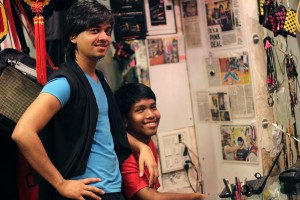By Mark Oltmanns, for TIME Video (class of 2012)
BIHAR, India, April 2012—How an innovative, sustainable energy source brings the 21st century to rural India.
—

By Mark Oltmanns, for TIME Video (class of 2012)
BIHAR, India, April 2012—How an innovative, sustainable energy source brings the 21st century to rural India.
—
By Marta Franco (class of 2013)
 MUMBAI, India, April 2012—After more than a century in the shadows, India’s homosexuals emerge from the closet.
MUMBAI, India, April 2012—After more than a century in the shadows, India’s homosexuals emerge from the closet.
On a sunny Sunday afternoon, Mumbai’s western suburb of Bandra, home to mostly observant middle-class Roman Catholic and Sunni Muslim families, is packed with people. Visitors and residents stroll the seaside promenades. The shop-strewn main streets are abuzz with vendors selling cheap shoes and colorful scarves. On the quieter, tree-lined lanes, customers visit little specialty boutiques and stores.
Down the 16th Road, a rainbow flag welcomes you to one such store: D’kloset. Outside, there is a mural of a man pulling another out of a closet. “No, no,” he says. “I’m not coming out.”
D’kloset owner Inder Vhatwar will tell you that is time for gay people in India to step out of the closet that locked them in for more than a century.
—
Marta’s final story is a print piece.
The fellowship is named in honor of Nirupama Chatterjee, who lived through India’s independence in 1947 and the opening of India’s economy in the early 1990s. Despite her reverence for tradition, Mrs. Chatterjee was very much a modern, forward-looking woman. She insisted that her three daughters have as much access to education as her three sons, and when several of her children immigrated to the United States, she was able to bridge the two cultures. Until her death in 1998, she remained open to a new world and excited by its possibilities. This fellowship honors her enduring spirit.
By Octavio Raygoza (class of 2012)
MUMBAI, India, April 2012—As a virulent, new drug-resistant tuberculosis strain surfaces in India, the world fears a resurgence of its oldest disease.
Instead of helping her mother with household chores, Sonam S. Yambhare lay quietly on a rusted bed. She was one among dozens of women in Ward 8, a silent room with unpainted concrete walls in Mumbai’s 103-year-old government-run Sewri Tuberculosis Hospital.
There was no medical equipment in sight. Records were filed in rusted metal cabinets. Sometimes, orderlies, or “ward boys” as they are called, carried away the infected mattresses of dead patients. “Everyone is depressed here,” said Mokshada Chandge, a young doctor on her rounds, explaining the silence, a sharp contrast with the ceaseless bedlam of one of the world’s most densely populated cities.
—
Octavio’s final story is a print piece.